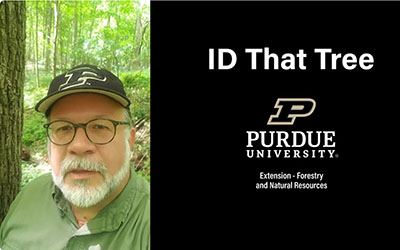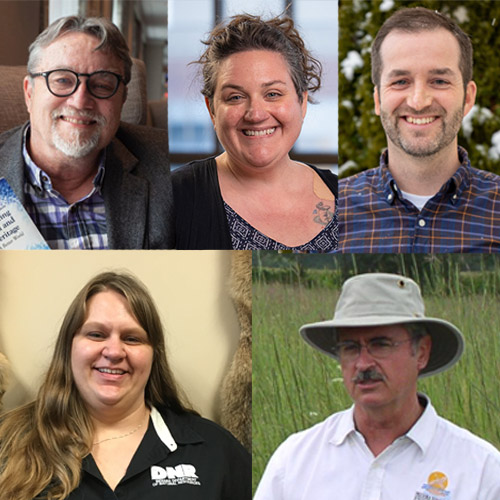FNR Welcomes New Faces to Faculty, Staff
The Purdue Department of Forestry and Natural Resources includes many new faces for the 2024-25 school year, including three new faculty members and several others who have joined FNR’s ranks since the beginning of the 2023-24 academic year.
Dr. Patrick Ruhl, a two-time alumnus (MS 2014; PhD 2018), returns to the department as a clinical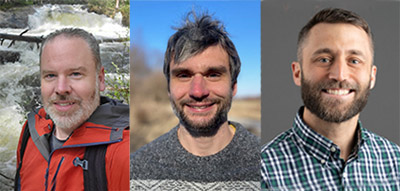 assistant professor. Dr. Peter Euclide transitions from his role as senior aquatic ecology research scientist under Dr. Tomas Hook to an assistant professorship in fish genetics and ecology. Dr. Shawn Crimmins also joins the ranks of FNR affiliated faculty as the leader for the newly formed Indiana Cooperative Fish and Wildlife Research Unit, a collaboration with the U.S. Geological Survey, and an adjunct assistant professor.
assistant professor. Dr. Peter Euclide transitions from his role as senior aquatic ecology research scientist under Dr. Tomas Hook to an assistant professorship in fish genetics and ecology. Dr. Shawn Crimmins also joins the ranks of FNR affiliated faculty as the leader for the newly formed Indiana Cooperative Fish and Wildlife Research Unit, a collaboration with the U.S. Geological Survey, and an adjunct assistant professor.
Ruhl, who earned his bachelor's degree in biology from Harding University and both a master's and PhD in wildlife science from Purdue, reunites with FNR after gaining six years of teaching experience at his alma mater, Harding. His previous research initiatives have focused mostly on birds and herps, with a heavy focus on undergraduate mentorship and involvement. At Purdue, he will be teaching several undergraduate FNR courses and continue his mentorship of undergraduates in wildlife research projects. Ruhl received was selected as the early career recipient of the Chase S. Osborn Award for Wildlife Conservation in 2022.
Euclide joined FNR as a research scientist in 2021 and later acted as fisheries specialist with Illinois-Indiana Sea Grant. He serves as the advisor for the Purdue student chapter of the American Fisheries Society.
Prior to arriving at Purdue, Crimmins spent four and a half years as the assistant unit leader at the Alaska Cooperative Fish and Wildlife Research Unit at the University of Alaska Fairbanks. His research focuses on population dynamics, monitoring, and habitat use of terrestrial wildlife.
2021 wildlife alumna Rachel Brent is back in FNR as a Natural Resources Instruction Specialist and the FNR Collections Curator. She acted as a teaching assistant and as a lab lead in the FNR specimen lab during her undergraduate career. Brent is a natural history artist specializing in taxidermy and scientific illustration.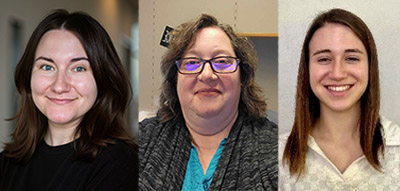
Patti Foster was hired as graduate program administration specialist in June, coming to FNR from the department of statistics, where she served as graduate coordinator for the past seven years. Foster graduated from Purdue in 2017 with a master’s degree in curriculum and instructional education with a concentration in career and technical education.
Erica Kronenberger was named as the research coordinator for the Human Dimensions Lab in July. She recently graduated from the University of Oklahoma with a master’s degree in geography and environmental sustainability. Her research focused on equitable climate change adaptation and environmental justice.
In the spring, Sherri Reinsch joined FNR in the role of Hellbender Husbandry Coordinator, while Hannah McNeese was hired as the lab manager at the Wildlife Ecotoxicology Research Facility (WERF).
Reinsch earned her bachelor’s degree in biology at the University of Wisconsin-Stevens Point with a minor in captive animal husbandry. She began working at the Nashville Zoo as the amphibian keeper, working her way up to lead keeper of the Herpetology Department. Reinsch spent more than 16 years at the zoo, assisting with collection management, mentoring and training keeper staff, facility management, and other daily operations of the Herpetology Department. Her primary area of expertise is with amphibians with a special focus on Eastern Hellbenders (Cryptobranchus allegainensis). She has worked on several conservation projects including the Puerto Rican Crested Toad (Peltophyrne lemur) and Panamanian Golden Frog (Atelopus varius). She worked to develop artificial reproductive technologies for eastern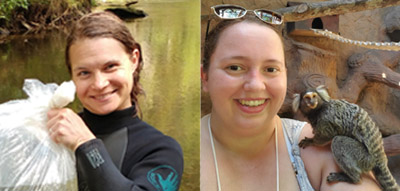 hellbenders which led to the first captive produced offspring. She was also vital to the hellbender head-start program in middle Tennessee. She helped collect eggs for rearing, handled the primary care of all the animals released, and identified habitat for release.
hellbenders which led to the first captive produced offspring. She was also vital to the hellbender head-start program in middle Tennessee. She helped collect eggs for rearing, handled the primary care of all the animals released, and identified habitat for release.
McNeese comes to FNR after spending the last three years working as an instructional lab manager at the University of Texas in Austin. She earned a master's degree in biology from Sam Houston State University, where she did a thesis project on endohelminth parasites of Black and Red Drum.
The Hardwood Ecosystem Experiment hired Rae Garrett and Kat Shay as field coordinator and project coordinator in May 2024 and September 2023 respectively.
Garrett graduated from Purdue in 2022 with a bachelor’s degree in wildlife and a minor in insect biology. Since then, she has worked as a technician on the HEE as a bird/small mammal technician and as bird and bat fatality monitor with WEST. She also assisted with outreach work for the International Crane Foundation.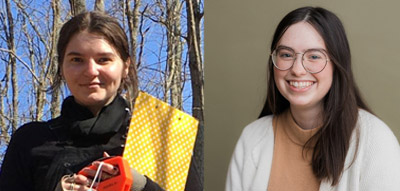
Shay earned her bachelor’s degree in environmental science from the University of Alabama, where she worked in the Spatial Ecology Lab. She received her master’s degree in environmental science and a master’s of public administration from Indiana University, where she worked in Dr. Kim Novick's lab on various phenology, carbon flux, oak leaf-miner, and cicada projects in Morgan Monroe and Yellowwood. She worked for NOAA at the Beaufort Lab in North Carolina, conducting research on carbon flux and storage in rapidly eroding salt marshes. Most recently, Shay worked in the San Bernardino National Forest in southern California, managing conservation, recreation, and restoration projects.
The Sepúlveda Lab brought on aquatic animal researcher Deise Cruz. Cruz received her PhD in ecology, evolution, and animal behavior from the University of Missouri-Columbia, researching the auditory behavior of toads and the neurophysiology of katydids' vocal communication. Growing up surrounded by the Brazilian rain forest, she has worked with frog diversity since her sophomore year, performing field work, assisting in the Natural Museum, documenting specimens, and collecting morphological and acoustic data. A significant portion of Deise's time was also spent on education, as a teaching assistant in biology labs and as an instructional collaborator for the EcoEvoApp-R/shiny language platform for ecology model learning. Additionally, she is also the co-founder of a group of 400 volunteers who remotely tutored children from Brazilian public schools during the pandemic.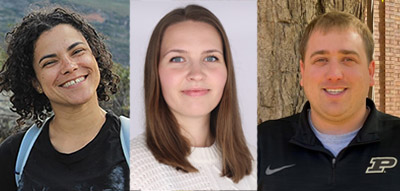
Illinois-Indiana Sea Grant added a new staff member in aquatic ecology and buoy specialist Les Warren.
Warren obtained his bachelor’s degree in environmental and ecology biology from the University of Wisconsin Eau-Claire. He earned his master’s in environmental biology from St. Cloud State University where his research was primarily focused on aquatic toxicology and the effects of septic system discharge on native fish species in Minnesota lakes. Since arriving at Purdue in 2020, Warren has been working towards his PhD in fisheries and aquatic sciences. His research focuses on the early life habitat utilization and recruitment dynamics of fish species in Lake Michigan.
Katie Grong joined the Institute for Digital Forestry as a research associate focusing on genetic tree improvement and the development of an online database for synthesizing forest invasive pests. She is working to create a directory of genetic tree improvement trials to be made available to the public as well as an online database for synthesizing forest invasive pest survey data. Grong earned her master’s degree in geography and biology from Missouri State University.
Additions to the administrative/professional staff include:
- Business manager Kristen Miller. Miller joined the department in March. She has worked at Purdue for
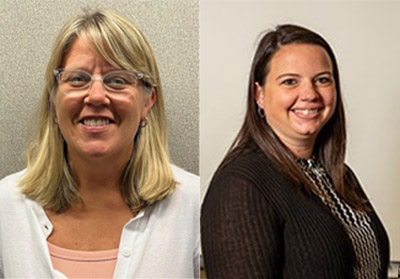 eight years, spending five and a half years as a business manager in Engineering Administration and the last two and a half years as a talent management specialist in Leadership & Organizational Development in HR.
eight years, spending five and a half years as a business manager in Engineering Administration and the last two and a half years as a talent management specialist in Leadership & Organizational Development in HR. - Business assistant Lisa Lawson. Lisa has worked at Purdue for 12 years, spending 11 of those working in the Purdue Polytechnic Institute business office.
- Senior administrative assistant Melissa Ledman. Ledman joined the department in March, serving as the senior administrative assistant for FNR undergraduate and graduate programs. She provides support to faculty and staff the areas of academic and career advising, alumni relations, career
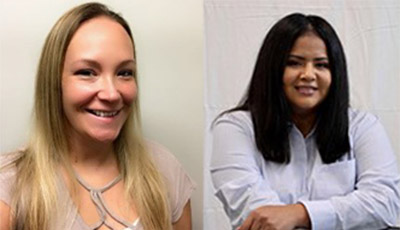 services, class scheduling, and general program support. Ledman graduated from Indiana Business College in 2005 with an associate's degree.
services, class scheduling, and general program support. Ledman graduated from Indiana Business College in 2005 with an associate's degree. - Senior administrative assistant Sandra Toruno. Prior to joining the FNR team at Purdue, Sandra was the administrative manager at NICHES Land Trust. Prior to that, she managed operations for her family's tax business for 10 years. Over the course of her career, Toruno has learned how to serve for the betterment of organizations effectively. She serves as Family Chair of the Latino Center for Wellness and Education, a position which has enabled her to grant access and education about conservation to the Latino community in Greater Lafayette. Her goal is to make nature a resource for wellness for the community that has given her and her family a home in Lafayette.




